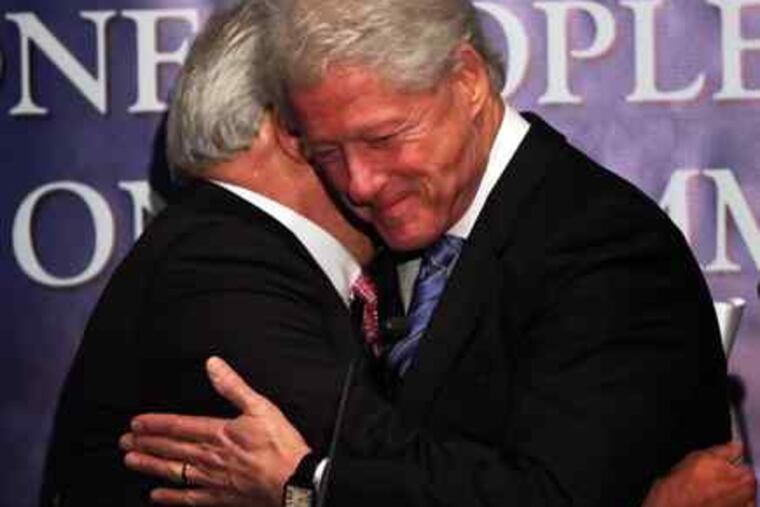Bill Clinton speaks to Jewish charity in Phila.
Rwanda, a nation working hard at ethnic reconciliation after years of violence, provides an instructive example of how to live in an interdependent world, former President Bill Clinton said last night in a speech to the Jewish Federation of Greater Philadelphia.

Rwanda, a nation working hard at ethnic reconciliation after years of violence, provides an instructive example of how to live in an interdependent world, former President Bill Clinton said last night in a speech to the Jewish Federation of Greater Philadelphia.
"You do this work you do out of love and affection for people with whom you identify," Clinton told about 750 people at a fund-raising reception for the Jewish charity. "The Rwandans do this work with people who killed their loved ones, because they can't get away from each other."
The nation's per-capita income has quadrupled in the last 11 years and once-hostile tribes are living together in peace, under the leadership of a government that stresses understanding the past and then letting it go, Clinton said.
"This question of identity . . . is the question of the 21st century," Clinton said during the event at the Hilton Philadelphia City Avenue. He said "we can figure out" the challenges of the world, such as climate change and unequal access to health care, if we figure out how to live with one another.
The federation said it raised $3.5 million for its work in education, fighting poverty, and providing social services to families and senior citizens in the region and in Israel. Last night's reception, preceded by a dinner for leading donors, kicked off the federation's annual appeal campaign.
"We're feeling the effects of the economy, but it's not as bad as you might think, because we have a committed community," Leonard Barrack, president of the federation, said in an interview. "They have their own challenges but realize there are people worse off than they are."
He said the former president was invited because of his work with the William Jefferson Clinton Foundation fighting AIDS, malaria, and poverty in the developing world.
In his wide-ranging remarks, Clinton said that there had been an explosion of nongovernmental organizations doing good works around the world in the last 20 years. The United States alone has 1.1 million foundations, half of them started within the last decade, he said.
"There is a general recognition everywhere that there are limits even in best times, let alone worst times, to what the private sector can produce and the government can provide," Clinton said, adding that charities "fill in the gaps." He called the growth "one of the most hopeful developments of the 21st century."
In one of the few mentions of the current administration, Clinton said that President Obama "did about as good as he could do with" the decision to increase troop levels in Afghanistan and set a deadline to begin withdrawal. "Now all he can do is be resolute in trying to make it work. . . . The thing that encourages me is that they are thinking about it."
He said that Israel would face a wrenching choice soon of whether to continue to be a Jewish state or a democracy, because there are far fewer Jews than Arabs living on the land and the Palestinian population is growing much more quickly.
"I don't think Israel can ever live so it is immune from consequences what happens around them, and I think they should still try to make the [peace] deal," Clinton said. "Will Israel survive? Yes, and most Americans feel like I do: We will do whatever it takes to make sure it does. But what will life be like there? What do you want it to be like?"